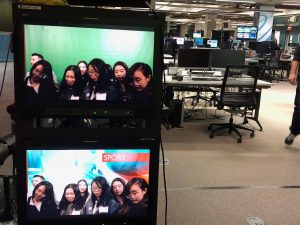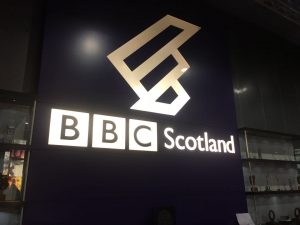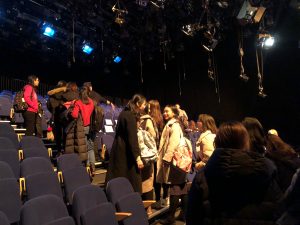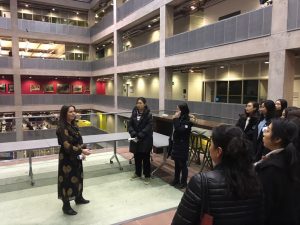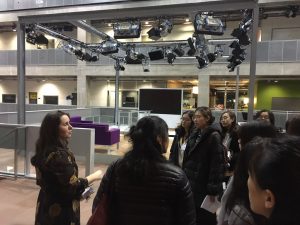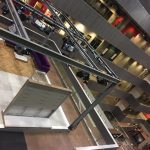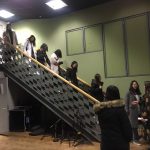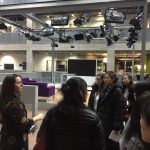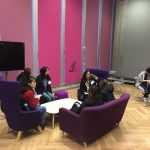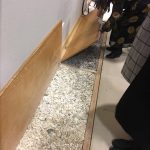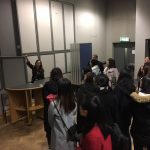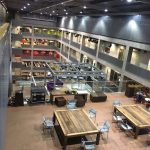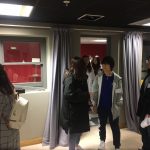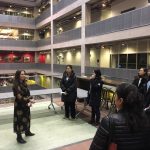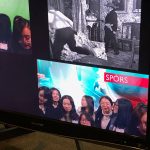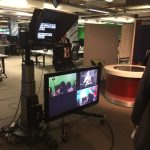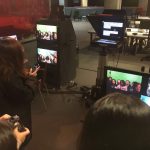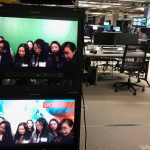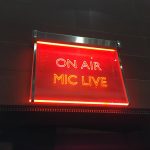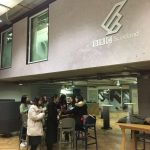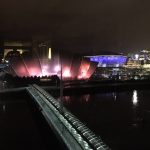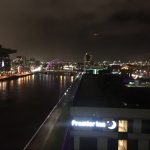This week we visited BBC Scotland and had the opportunity to gain access to the BBC TV studios, newsrooms and radio studios. We interviewed Mrs. Sara Gardner who spoke to us about the production cycle and interesting facts about the production of news and radio programmes.
We also sat in the audience of Braking the News with Des Clarke, the popular BBC radio show which had its very first appearance on television with its St. Andrew’s special on BBC 2 Scotland.
“Can you imagine the sort of programmes that will be on Donald Trump’s television channel? Just like Makeovers with Melania, showing you how to signal for help using only a contour brush and a lip liner.”
“I’m a bit worried, the cows are getting the blame of all this global warming. Because they are farting a lot. I have politely asked my cows to hold it in.”
“What makes Dundee become the hottest city?”
…
This was the recording scene of the comedy show on BBC Scotland, Breaking The News, which made all the audience on the spot laugh and applaud frequently. We were so fortunate to be part of the audiences on the 29th November, and got a unique chance to visit the whole building of BBC Scotland. From this experience, while broadening our horizons, we also felt many differences in our different cultures.
Breaking The News, for BBC Radio Scotland began a 10 week run on Friday 5th June. Describing it, the BBC says: ‘A mix of the UK’s top comedians, journalists and up and coming stand-up talent [takes] a satirical swipe at the week’s news in Scotland and across the UK’.
Mrs. Sara Gardner who works in the Client Relations Department of BBC Scotland told us that Breaking the News is not a serious news programme, but a comedy programme about the news. It mocks current affairs and makes fun of the news. The programme actually started as a radio programme and what we saw was the first time they recorded for television (BBC 2 Sccotland).
The audience in the studio burst into laughter over and over again while warthing Breaking the News due to its satirical overtone. It is interesting to find out that sometimes we could not understand why people laughed. This was because many of the points were what local residents were familiar with but we were not aware of.
The elderly are the main group of people who came to participate in the show recording. When asked about the age range of its audience, Mrs. Gardner said it was a comedy program that everyone could enjoy. Its audience would range from the elderly to people in their 20s or 30s. There are many older people attending recording in the daytime because older people have more free time than younger people since they have retired. In addition, older people signing up to watch shows which are usually free. Anyone who wishes to participate in the recording of Breaking the News can sign up by clicking on the relevant link on the BBC website.
When asked about what kind of skills one needs most to work for the BBC Scotland, Mrs. Gardner answered that everyone who works there has different skills but she thinks the most important thing is to be flexible and adapt to the new television environment. People wor work there have many opportunities to learn and master different skills. Only with a positive attitude, flexibility, can we do a good job here, she said.
After visiting the production studios of BBC Scotland, we realized why the BBC program is so creative. The six-story headquarters building is not large, but the interior is full of mystery.
Mrs. Gardner took us to the rooftop of the Building and enjoyed the views of Glasgow skyline.
The building is generally made into a hollow central structure, with the middle part transformed into a spacious open hall, which maximizes the empty space utilization. There are cafes, office computers, and small studios in the open areas, and people can clearly see every corner of the interior of the building no matter which floor they work on. This means that if you stand on the ground floor and eager to find a colleague on the sixth floor, you may just need to look up and shout at him or her.

There is no obvious separation between the desks in the office. People gather together for cooperation, rather than for work. Being exposed to an open environment makes it hard to be isolated and left out on your own.
Just as the Scottish proverb says “Guid gear comes in sma’ bulk“, BBC Soctland produces 15,000 hours of high-quality television broadcast programmes per year with just one thousand staff. It is obvious that their success relies not only on the hard work people put in, but also on the mining and innovation of their own culture.
Special thanks to Mrs. Sara Gardner.


